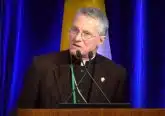U.S. bishops praise new immigrant family reunification program
Washington D.C., Jul 11, 2023 / 10:50 am
El Paso Bishop Mark Seitz, head of the U.S. bishops’ migration committee, on Monday praised the Biden administration’s new immigrant Family Reunification Parole program and called for more immigration reform.
“We welcome this effort to provide a realistic opportunity for attaining family unity and reunification,” Seitz said in a statement released July 10.
According to Seitz, unity and reunification are “foundational” to both “the U.S. immigration system and central tenets of Catholic social teaching.”
Quoting the 2015 Synod of Bishops report to the pope, Seitz said that “family relations contribute decisively to the sound building of human society in fellowship, which cannot be reduced to simply the inhabitants of a territory or citizens of a state who live together.”
The new program, announced by the Department of Homeland Security (DHS) on July 7, allows migrants from Colombia, El Salvador, Guatemala, and Honduras who have family members already legally residing in the U.S. to “be considered for parole on a case-by-case basis for a period of up to three years while they wait to apply to become a lawful permanent resident.”
Under this program, individuals from these countries who are caught crossing the border can potentially be released, granted “parole,” to legally reside in the country for up to three years, provided that a family member who is either a citizen or legal permanent resident successfully filed a petition on their behalf.
DHS Secretary Alejandro Mayorkas said that the processes laid out in the new program “promote family unity and provide lawful pathways consistent with our laws and our values.”
According to Mayorkas, “the department has proven that the expansion of safe, orderly, and lawful pathways, combined with strong enforcement, is effective in reducing dangerous, irregular migration to the United States.”
The new program allows select individuals who have been approved by the department to remain in the U.S. for up to three years, according to the DHS release.
Approval will be given “upon a demonstration of urgent humanitarian reasons or significant public benefit, as well as a demonstration that the beneficiary warrants a favorable exercise of discretion.”
“Individuals paroled into the United States under these processes will generally be considered for parole for up to three years and will be eligible to request employment authorization while they wait for their immigrant visa to become available,” DHS said.
After paroled individuals’ visas become available, they are then able to apply to become permanent residents, the DHS explained.
Besides praising the administration’s new program, Seitz also pointed out the need for additional immigration reform.
“Unfortunately, what the need for such programs demonstrates — and as similar programs created for Cubans and Haitians have already underscored — is that backlogs continue to pose untenable challenges for aspiring immigrants who seek to avail themselves of the limited legal pathways currently available, whether family- or employment-based in nature,” Seitz said.
“This is why my brother bishops and I, along with the vast majority of civic leaders and the American public, know immigration reform is ultimately the only true and sustainable solution to these challenges,” Seitz concluded. “We continue to urge Congress to come together on a bipartisan basis to achieve this, a difficult but not impossible task.”
Seitz pointed to the Dignity Act of 2023 as evidence that bipartisan immigration reform is possible.
The Dignity Act was introduced in the House of Representatives by Reps. María Salazar, R-Florida, and Veronica Escobar, D-Texas. If passed, the Dignity Act would provide undocumented migrants a pathway to obtain legal status if they meet several requirements, including passing a criminal background check and paying back any taxes they may owe.













